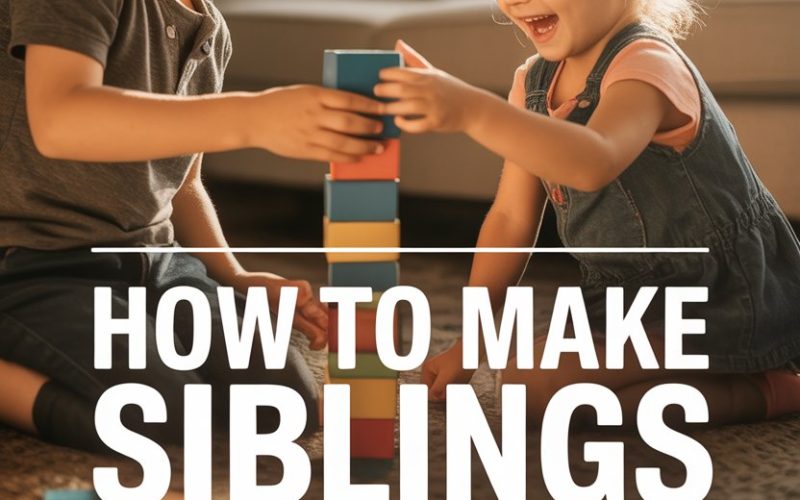Sibling squabbles: part background noise, part Olympic sport in many homes.
Parents dream of that magic button—press here for instant harmony, all bickering vaporized.
While the button’s still in beta testing (somewhere in a top-secret, soundproof lab), there are ways to help your kids get along, even if you’ve only got five minutes and a very strong cup of coffee.
Put down the referee whistle. You won’t need it.
What follows is a practical, real-world guide for parents who want less shouting and more sharing—tonight.
Start With the Environment
Kids are like goldfish: they grow to fit the tank you set up.
This means the way your home is organised can gently nudge them toward friendly behaviour. Are toys hoarded in one bedroom? Is there exactly one blue cup, triggering daily power struggles?
Try arranging communal spaces and shared resources so no one kid rules the roost. Stock up on neutral items: plain cups, unbranded stationery, shared puzzles.
Less “that’s mine!” means more “let’s play.”
And if you have the space, a ‘peace corner’—think beanbag, some fidget toys, and a pile of comics—lets kids cool off without escalating into full-scale warfare.
Set Crystal-Clear Expectations
Vague reminders like “be nice to your brother” often float off into the ether.
Little ones, bless their loophole-loving hearts, will interpret this as “don’t actually whack him with a toy truck,” not “maybe share the remote for once.”
Set ground rules everyone understands. Examples: “We use kind words,” “We ask before borrowing,” “No hitting, ever.”
Stick these on the fridge. Act them out with Lego people if you have to—kids love a good, absurd demonstration.
When fights do break out, refer to these rules. Calm, predictable consequences (“If you shout, you cool off in the peace corner until you’re ready to talk kindly”) teach that you mean business.
Model the Behaviour You Want to See
Easier said than done, especially after a rough day, but children are uncanny mimics.
If you and your partner resolve disagreements by sulking, yelling, or muttering about each other in the kitchen, guess what the kids will do?
Demonstrate how to apologize.
Let your kids see you take turns, listen, and say, “You go first.” Put a little theatre into it—“Oops, I interrupted, sorry! Your turn!”—and your children will copy you faster than they copy TikTok dances.
Where possible, narrate your feelings: “I feel frustrated, but I’m going to take a deep breath instead of shouting.” Sounds silly, works wonders.
Don’t Force Togetherness
Yep, siblings should love each other. But they’re not auditioning for The Waltons.
Insisting that your kids play together every moment often leads to resentment, especially if there’s an age or interest gap. Allow for alone time.
If one wants to read while another wants to build a blanket fort, that’s fine.
Encourage parallel play (being near each other but doing separate things). Sometimes, just being in the same room—no pressure, no forced “bonding”—lets affection grow naturally.
Praise Collaboration Loudly and Often
Catch them being good. No, really—catch them!
If you hear your kids giggling together or see them sharing a snack without prompting, pause whatever you’re doing (texting, laundry, staring blankly into space) and praise them.
Try specifics: “I love how you asked your sister if she wanted a turn,” or “It was great seeing you two work out who got the last biscuit without fighting.” Vague “good job”s are nice, but details sink in.
According to experts at Harvard, positive reinforcement works far better than harping on the negatives. Sprinkle it liberally.
Pick Your Battles Wisely
Not every brotherly squabble deserves the full United Nations mediation treatment.
Some bickering is actually healthy—kids learn negotiation, compromise, and the subtle art of not stuffing a sock in their sibling’s mouth.
Ask yourself: is this an annoying but harmless spat, or is someone actually getting hurt (physically or emotionally)?
Often, stepping back and letting your kids solve low-stakes issues teaches them resilience and problem-solving.
You’re not failing if you don’t leap in every time. You’re giving them tools for life. (And saving your own sanity.)
Teach Simple Conflict Resolution Skills
Kids are not born knowing how to say, “When you took my crayon, I felt annoyed. Can we share?” Half the time, they’re not even sure why they’re upset.
Try the “talking stick” method. Hold anything—a stuffed animal works—and the holder gets to talk while the other listens, then swap.
Teach them to use “I” statements: “I felt sad when you wouldn’t let me play.”
Young children might need prompts or scripts.
There’s no shame in saying, “Can you tell your brother what made you mad?” Practice during calm moments, not just in the heat of battle.
Research shows that teaching these skills early leads to better relationships throughout life.
Use Teamwork to Your Advantage
Few things bring siblings together like a common cause—especially if it involves grown-ups wobbling on ladders or dogs in silly hats.
Set up cooperative games or chores. Build a pillow fort, bake cookies, or send them on a scavenger hunt (“find three blue socks between you”).
When they have to work together, competition slides away and teamwork takes centre stage.
If your children are older, let them plan something—a picnic, a silly dance video, a prank on Dad. The dynamic shifts when they’re partners in crime, not rivals.
Watch Out for Triggers
Every family has flashpoints: a certain toy, a favourite seat at the dinner table, a mysterious urge to wrestle just before bedtime. You know your kids’ patterns better than anyone.
If you can predict when and why fights erupt, you can often head them off. Maybe the secret is rotating the “best” chair.
Perhaps it’s a timer for turns on the iPad. Or it might be as simple as ensuring both have a snack before hunger-fuelled meltdowns.
And when in doubt? Blame the Wi-Fi. (Kidding. Sort of.)
Don’t Compare Them
This one’s sneaky. “Why can’t you be more like your sister—she always cleans up!” Oof. Instant rivalry.
Comparisons, even the well-meaning kind, make kids feel insecure and drive them further apart. Emphasize each child’s strengths without pitting them against one another.
Say, “I love how you always remember to feed the cat,” and “Your drawings are so creative.” Leave out the “unlike your brother” bit.
Psychologists at Child Mind Institute stress that avoiding sibling comparisons is one of the best ways to encourage healthy relationships.
A Little Absurdity Goes a Long Way
Humour diffuses tension faster than a stern lecture ever could.
When tempers flare, try an unexpected twist: speak in a silly voice, declare a “no fighting, only interpretive dance” rule, or challenge everyone to a “who can pull the silliest face” contest.
Laughter breaks the cycle and reminds kids (and you) that family life doesn’t have to be so serious.
Tip: Dance parties in the kitchen work wonders, and you only look ridiculous if you get caught.
When to Step In
Occasionally, sibling fighting crosses a line—bullying, repeated aggression, or emotional cruelty are red flags.
Intervene quickly if a child feels unsafe or targeted. Separate them, offer comfort, and explain clearly that certain behaviours are never acceptable.
If conflict seems constant and intense, a chat with a family therapist can help spot deeper issues.
You’re not admitting defeat. You’re showing your children that love sometimes means seeking help.
Reassure Each Child of Their Place in the Family
At the end of the day, much sibling rivalry comes down to a desire for attention and belonging. Make time for one-on-one moments with each child—even ten minutes snuggled up with a book can work magic.
Kids who feel secure in your love don’t need to jostle for position (as much). Remind them, “You’re my favourite you.” It’s cheesy, but effective.
The Not-So-Secret Truth About Sibling Harmony
Here’s what every seasoned parent eventually learns: siblings aren’t meant to get along all the time. Friction is normal.
The odd squabble? Free life skills training.
But with a few tweaks, a dollop of empathy, and the occasional banana costume, you can help your little ones choose kindness more often than chaos.
And on the days they do, even for five minutes, that’s a win worth celebrating.
Just don’t expect absolute peace—at least, not until someone invents that magic button.




